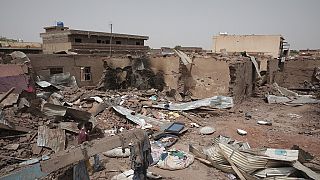Nigeria
Nigeria, with its abundant natural gas reserves, is embracing a new era in transportation.
The adoption of Compressed Natural Gas (otherwise known as CNG) to power vehicles offers a sustainable and economical alternative to traditional fuels, tackling the country's dependency on fuel imports and combating environmental pollution.
At this conversion centre in Abuja, vehicles are being transformed to run on CNG. The initiative promises a lifeline to many Nigerians struggling with rising fuel costs.
Taxi driver Oche Ogenyi is one of the many benefitting from this shift.
Ogenyi says: "When I was using fuel, on a daily basis, I buy fuel of 30,000 to 40,000 naira ($18 -$23.50 USD). And at the end of the day, when I come home, I make a profit of just 5,000 naira (£3). But with the introduction of the CNG after the conversion, I will spend just 5,000 naira buying gas. And at the end of the day, I make an interest of 30,000 naira on a daily basis. The difference is much.”
However, not all aspects of the transition are seamless. Challenges like limited fuelling points lead to longer waits for drivers.
Ogenyi adds: "As a transporter, you know, time is money. When I was using fuel, I go to the filling station just to buy fuel and leave. But now that I am using CNG, I spend more time in the filling station to buy gas and the reason why I spend more time there is that there is no availability of filling point here.”
Engineers who convert cars to use CNG are keen to allay safety fears surrounding the risk of explosions in vehicles using the cylinders.
Yunus Idris, a CNG conversion engineer says: "A lot of people have fear of the cylinder exploding."
"The cylinder is designed with safety in mind. The thickness of the cylinder alone is about 7.5 millimetres. That is even as much as a bulletproof or even explosion proof. So from experience and from what we've seen so far all over the world, it would be difficult for the cylinder to just explode. And the cylinder we are using here, the rate, the parameter they use for the design is going to be used between -40°C (-40 degrees Fahrenheit) and over 60°C (140 degrees Fahrenheit), which in Nigeria our temperatures never goes above 50 (122 Fahrenheit)."
Scaling up the infrastructure for CNG distribution is key to making this initiative viable.
Tosin Coker at the Presidential CNG Initiative says the financial and environmental benefits of using CNG far outweigh the challenges.
"Conversion of vehicles from petrol or diesel to gas is critical to the economy" he says.
"The government has been subsidising petrol vehicles, and we calculate that on average, about 6 or 7 million naira ($3,500 or $4,100) is spent per vehicle per year. That translates to a colossal amount of money, and it is money that the government does not have to keep spending."
Coker also highlights environmental benefits.
"It's cleaner; it's cleaner for the environment. So, the air that you and I breathe, the more of us who switch to CNG, the better for our environment. It's cleaner for your car, it's cleaner for the engine of your car. The health of your car will be much, much better. We can't vouch for a lot of the quality of the petrol that we're putting in our petrol tanks these days. But gas is natural, gas is cleaner."
The transition to CNG represents a critical shift for Nigeria, promising economic relief and a cleaner, greener future. However, scaling up adoption will require significant investment in infrastructure and public awareness.
While Nigeria’s CNG initiative shows promise, long queues at fuelling stations and limited infrastructure highlight the challenges ahead.
The road to making this cleaner, more affordable fuel a truly viable alternative still has some way to go.












01:40
Nigeria celebrates independence day amid protests over economic hardship
01:09
Severe flooding in northeastern Nigeria leaves 30 people dead
00:42
Grisly road accident claims the lives of at least 50 people in Nigeria
01:40
Dangote refinery in Nigeria set for sale of petrol
Go to video
Floods in Nigeria kill scores and wash away farmland raising food insecurity
00:55
At least 6 killed, 10,000 displaced in Nigeria following heavy rains